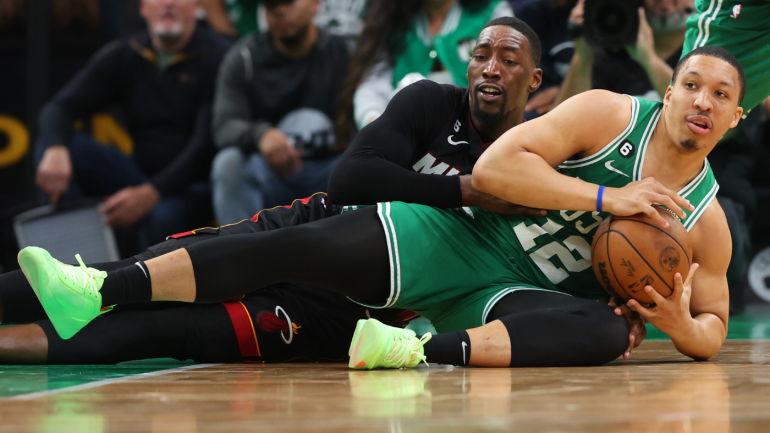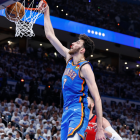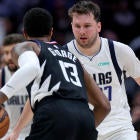
Before Game 1 of the Miami Heat's second-round series, the opposing coach listed the defensive statistics that he cares about: "Defensive field goal percentage, 3-point percentage, rebound margin, points in the paint, fast break points allowed."
Tom Thibodeau notably did not mention turnover rate or free throw rate, the two stats most responsible for his New York Knicks having the No. 19 defense in the NBA during the regular season (114.2 points per 100 possessions) despite holding opponents to 46.2% shooting, the third lowest mark in the league. The Heat went on to shoot a miserable 42.5% in the series, but eliminated New York in six games.
If this season's Knicks were proof that you can make opponents shoot poorly and still have an unimpressive defense, then Miami proves that the opposite is also true. Defensively, the Heat were No. 9 during the regular season (112.8 points per 100 possessions) despite ranking 22nd in field goal percentage (48.2%), 22nd in 3-point percentage (36.7%) and 25th in effective field goal percentage (56.1%). This was possible because they forced turnovers (16.1%, No. 3 in the NBA), limited offensive rebounds (26.7%, No 4) and kept opponents off the free throw line (.253, No. 7).
Miami advanced to the conference finals and took a 3-0 lead against the Boston Celtics in part because it has morphed into a different (i.e. better at 3-point shooting) team for most of the playoffs and in part because of the identity it has had all along. When the Heat are at their best, they stress out opposing offenses by jumping passing lanes, switching, getting physical and playing zone. They find "relief points" by forcing turnovers, pushing the pace and crashing the glass. They make the game feel chaotic, but stay under control.
Just when Miami seemed to have thrown Boston into disarray, though, the script flipped. In Game 4, the Celtics kept their season alive by coming up with 27 points off turnovers and 18 fast break points and taking care of the ball themselves. In Game 5, Boston again scored 27 points off turnovers …
— bball james (@basketballvide0) May 26, 2023
… and 17 second chance points.
— bball james (@basketballvide0) May 26, 2023
On the series, the Celtics now have the edge in turnover rate, free throw rate, offensive rebounding percentage, points off turnovers, second chance points and fast break points. These are concerning numbers for the Heat, not only because they pride themselves on being tougher and more disciplined than whoever they happen to be facing but because the numbers illustrate how the series has shifted since they went up 3-0: For two straight games, Boston has looked completely unbothered offensively, and Miami has struggled to find any flow at all.
"Our offense was disjointed a little bit," Heat coach Erik Spoelstra said after the 110-97 loss on Thursday. "We weren't able to initiate our offense, get the ball where it needed to go in spots where you can operate."
You wouldn't have known it from the way the first three games played out, but Boston had the second-best defense in the NBA in the regular season. Facing elimination, it dialed up its ball pressure and did everything it could to nudge Miami toward inefficient iso-ball, and in Game 5 its defense was downright dominant. The Celtics switched almost everything against Jimmy Butler, stayed down on his pump fakes and loaded up when necessary. They switched smaller guys onto Bam Adebayo, too, and they pounced when he put the ball down. The Heat's Kyle Lowry was indecisive against drop coverage, and Boston ran their shooters off the 3-point line.

CBS Sports HQ Newsletter
Your Ultimate Guide to Every Day in Sports
We bring sports news that matters to your inbox, to help you stay informed and get a winning edge.
Thanks for signing up!
Keep an eye on your inbox.
Sorry!
There was an error processing your subscription.
Ahead of Game 6 on Saturday, there are some strategic decisions to be made. Maybe Miami will start playoff hero Caleb Martin over Kevin Love and find more minutes for sharpshooter Duncan Robinson, whose two-man game with Adebayo has remained a reliable source of good looks. Boston needs to figure out how to allocate the minutes that are usually earmarked for Malcolm Brogdon, since a torn tendon in his arm has turned the Sixth Man of the Year into a non-threat. Generally speaking, though, this series has reached the point where everybody knows who's getting targeted defensively, what lineups the coaching staffs trust and what actions these teams will turn to in crunch time.
For the Heat to avoid a Game 7 in Boston, then, the formula is simple, but that doesn't make it any easier to execute. They need to make better, quicker decisions in the halfcourt and stop gifting the Celtics transition points. They need to expect ball pressure, expect gang rebounding and find ways to get into the paint, get to the line and get out on the break. They need to be as composed, connected and committed to winning on the margins as Boston has been for the past couple of games. Both teams would love nothing more than a barrage of 3s from their shooters or a 50-point performance from their respective superstars, but they know better than to rely on it.






















